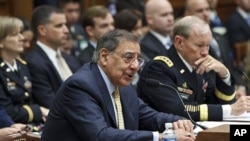U.S. Defense Secretary Leon Panetta told a congressional panel on Thursday that the Pentagon is providing "nonlethal aid" to the civilian-led opposition in Syria and that it is preparing additional measures if it becomes necessary to help protect the Syrian people.
Amid concern from some members of the U.S. Congress that the United States might be planning a military intervention similar to one in Libya last year, Panetta said there are similarities, but also important differences in the two situations.
He testified before the House of Representatives' Armed Services Committee, saying the United States stands with the Syrian people.
"Our policy towards Syria is very clear. We support a political and democratic transition that fulfills the Syrian people's aspirations," Panetta said.
Panetta told the panel that the United States is sending "nonlethal" aid to the Syrian opposition, including communications and medical equipment. The Pentagon also is providing $25 million of humanitarian relief.
Watch related Michael Bowman video report
U.S. Army General Martin Dempsey, the chairman of the Joint Chiefs of Staff, said that so far, the U.S. military’s role has been limited to sharing information with regional partners. But he added: "Should we be called, our responsibility is clear - provide the secretary of defense and the president with options."
The Republican chairman of the House Armed Services Committee, Howard "Buck" McKeon, and the committee's ranking Democratic member, Adam Smith, said they are opposed to U.S. military intervention in Syria at this time.
"On the other hand, there is much we do not know about the opposition. Syria also maintains robust air defenses that limit military options. Therefore, I am not recommending U.S. military intervention, particularly in light of our grave budget situation, unless the national security threat was clear and present," McKeon said.
Several lawmakers expressed concern that the White House is preparing to intervene in Syria militarily, similar to last year's Libya operation that some of them opposed, without first getting authorization from Congress.
Republican Representative Randy Forbes put this question to Secretary Panetta: "It is your position that the [Obama] administration's position would be that we would have to get a consensus of permission from the international community before we would act, but that we would not have to get specific statutory authority from Congress before we would act?"
Panetta said President Barack Obama would act in consultation with international partners, and in accordance with the U.S. Constitution, working with Congress.
Representative Smith said he keeps hearing that Syrian President Bashar al-Assad's time in office might be coming to an end, but that Assad is still in power. Smith said he is concerned.
"What is the path for that happening? Because as I said in my opening remarks, the Assad regime has sort of decided they don't care what the international community thinks - they are going to kill as many people as they need to kill to stay in power," he said.
Panetta said that Syria is different from Libya in several important aspects. He said President Assad still appears to enjoy the support of a large segment of the Syrian military and that Arab countries are not lined up in support of military intervention. But Panetta said the intelligence community feels that the insurgency in Syria is so broad-based that Assad ultimately will be forced from office.




